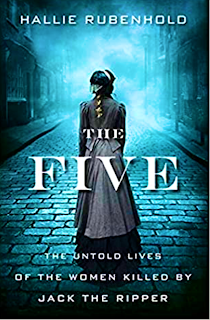Halie Rubenhold's book comes as a welcome counterbalance to our preoccupation with who Jack was by investigating the lives of what are called the five "canonical" victims of Jack the Ripper (Ripperologists say there might be more). Rubenhold has meticulously examined all the documentary evidence available to the modern researcher, including the coroner's reports (three cannot be found) and a mass of newspaper articles. She does not include details of the victims' deaths, which are usually described in chilling detail in the popular books about the Ripper. I had always believed that all the victims were prostitutes. Rubenhold demonstrates that there is no evidence of prostitution for three of the victims; the press at the time simply attached that term to all women who lived in "common lodging houses" or slept rough on the streets. She says:
"...on the nights they were killed, no-one came forward to state they had been solicited by Polly, Annie, Kate or Elizabeth".
The murders themselves, instead of being prostitute/client liaisons, might have happened simply because the victims were asleep, or helplessly drunk.
Frances Wilson, in The Guardian, says of the victims:
"Their lives are grimly similar: born into hardship, they moved from the briefest of childhoods into a cycle of childbearing, alcohol dependence, poverty, emotional despair and homelessness.
After reading the book, I totally concur in that verdict. Besides this, Rubenhold illustrates the invidious position of women - especially working class women - in Victorian society. Women were expected to be paragons of faithfulness and propriety. Any deviation from this norm was severely frowned upon; any woman who had sex before marriage, committed adultery, or drank too much, risked losing everything, while no such calamity awaited men. Besides this, there was the hazard of domestic violence, which was widely tolerated at the time. There were also the burdens of frequent pregnancy and the daily struggle to survive. The five Ripper victims were victims of all these factors before they encountered the Ripper. Death at his hands for them could almost be described as a sort of merciless release.
Polly Nicholls, the first victim, endured four years of a violent relationship before she was driven from her family after her husband began an affair with the woman next door. Annie Chapman was married to a coach man with good prospects but, at a time when alcoholism was not recognised as an illness, became an alcoholic. This led to her marriage break-up and the road to Whitechapel.
The third victim. Elizabeth Stride, nee Gustafsdotter, came from Sweden where, as a young girl, she had contracted syphilis and become something of a social pariah. Coming to work in London as a domestic servant, she later married John Stride and, for a time, ran a coffee-shop. The failure of her ventures led to a descent into alcohol abuse, homelessness and her murder on September 30, 1888. Catherine Eddowes, who died on the same September night in Mitre Square, also had a history of wandering, together with domestic violence. When younger, she left her Wolverhampton home for Birmingham, then London. She lived with a "chapman" (an itinerant seller of tracts and ballads) who beat her frequently. After leaving him, she teamed up with one John Kelly. 500 mourners turned out for her funeral. The final - and most horribly mutilated - victim, Mary Jane Kelly, was something of an enigma. After her gruesome death, no relatives ever came forward, so it is uncertain whether we have her real name or not. She seems to have escaped back to London after being trafficked to Paris by an organised gang of pimps. She had previously worked in a brothel in a fashionable part of London, but it's now thought she went to Whitechapel to escape the traffickers. Sadly, she did not escape Jack the Ripper, who took her life on November 9th, 1888.
Reading this book was a salutary experience, and I shall not think of Jack's victims in the same way again. Rubenhold's aim was to restore their dignity as human beings, and in that she has succeeded. I cannot better this conclusion from Frances Wilson:
"The Five is not simply about the women who were murdered in Whitechapel in the autumn of 1888: it is for them. This is a powerful and a shaming book, but most shameful of all is that it took 130 years to write."








